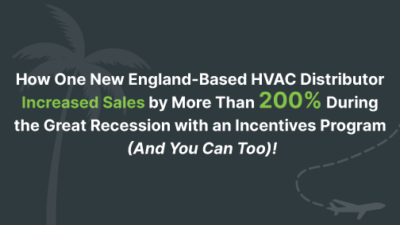If you’re a manufacturer or distributor who produces and/or sells complex products to a field of VARs across the U.S., you know how valuable your products can be to end-users, and you know how important it is to communicate this value to them.
Unfortunately, your channel partners aren’t as well-versed in the nuances of your products, and they don’t seem as concerned as you are with properly marketing your products to end-users. Because of these limitations, you feel like your channel sales aren’t performing like they should be.
What should you do?
Knowledge Is Profit
This is just one scenario in which product knowledge—or in this case, the lack thereof—can start to negatively affect your bottom line.
In the above example, there are a number of steps-to-the-sale strategies that can help boost your channel sales by arming your legion of VAR salespeople and sales engineers with the education they need to better sell your products.
The best and most common strategy is an eLearning solution. For example, if your product includes a service or process of some kind, you might task your marketing team with producing an easy-to-understand training video or other digital materials for your channel partners to consume.
But just because you’ve provided your channel with compelling content, doesn’t necessarily mean they’ll engage with it. That’s where an eLearning solution comes in.
By creating online modules or quizzes around your content—ideally with some sort of incentive built into them—you can motivate this indirect salesforce to not only watch the video or read the materials, but also actively demonstrate their learning in a way that’s easily measurable.
In other words, I won’t watch even one of that series of training videos on my own (unless my boss forces me too). However, if I were to receive, say, a free spin in a game-based spin-to-win promotion each time I watched one of the videos and answered a short five-question quiz, you can bet that I’ll watch the entire series just to increase my chances of earning that new flat screen TV.
And now that I’m more familiar with this product, I suddenly find myself more willing and able to talk about it when I meet with new customers.
Another situation where product knowledge can pay big dividends is during the release of a new, potentially high-margin product. Maybe your channel partners have been selling your products in the past, but you now have something new that’s set to be released and you really want your partners to push it end-users.
You might not necessarily have time to explain what makes this new product so great to all of your channel partners. However, your organization has prepared sales and/or marketing materials—say, a Powerpoint deck, product slider, or internal newsletter—that offers the relevant information about the new product’s capabilities.
Now, we’d like to think our channel partners would see these materials populate their inboxes and immediately jump at the chance to increase their sales output. But of course, this isn’t always the case, especially if the new product or service is something they’re unfamiliar with.
So, in order to entice these partners to not just open the emails or click on the attachments, but also to actually spend some time perusing what’s inside, maybe you embed a promo code inside the materials that can be redeemed for 500 points in their current points program.
Other Uses
Some other possible strategies focused around product knowledge include:
- Incorporating product information into your onboarding process for new sales staff. A special promotion specifically aligned to target these newer employees can help speed up the learning curve and get them excited to start promoting your products. This can also be tailored to fit with new channel partners.
- Including on-demand certifications that help improve expertise of specific product lines or services. These certifications can ensure that sales associates and channel partners have mastered the technical aspects and specific sales language necessary to speak competently about your products. Points and other incentive rewards can also be achieved upon completion of these certifications.
- Offering surveys through which channel partners can speak to the effectiveness of specific marketing or sales content. At the end of the day, you don’t just want to be creating content for content’s sake—you want it to have genuine value to the people who are pushing your products.
Conclusion
No matter how you go about promoting it, product knowledge is a powerful and often overlooked aspect of the sales process. It enables your channel salespeople to be more persuasive as they go about trying to move your products for you.
After all, yours may be just one of a dozen they’re selling for you and your competitors, so if you can help them to feel more comfortable talking about your products than someone else’s, it’s just another opportunity for you to gain a competitive advantage in your channel.
Photo by Cole Keister on Unspash




